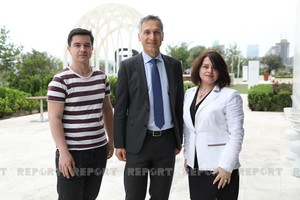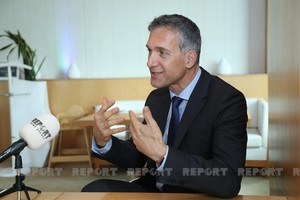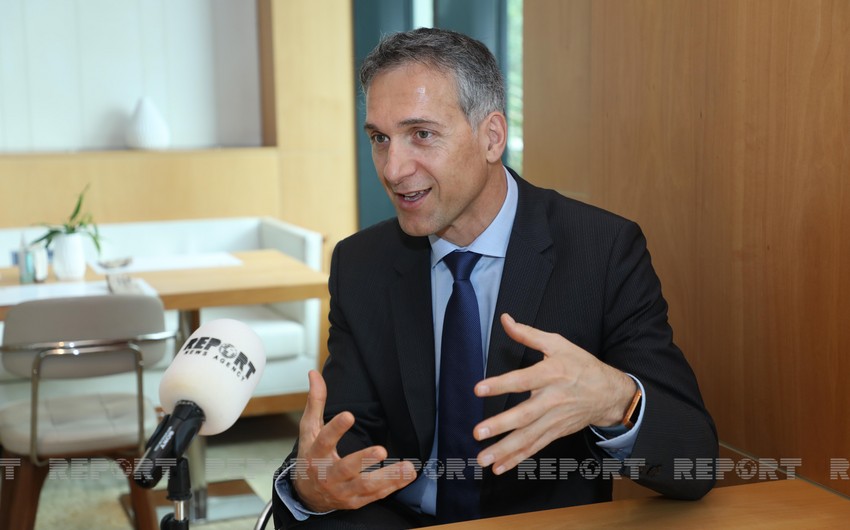Report's interview with Eric Rondolat, Chief Executive Officer and Chairman of the Management Board at Signify
Mr. Rondolat, you had direct contact with the President of Azerbaijan during the Davos forum last year, and there are preliminary agreements about your activities in Azerbaijan. In February, the President received you in a videoconference. It would be interesting to know your impressions about the meetings and the work you do in Azerbaijan.
We have met a few times in Davos. Because of the pandemic, our February meeting was not in Davos but was conducted by videoconference, I was at home, and we also met May 25. So there have been several meetings, not just one. I came away with multiple impressions.
One impression is the very high concern for the environment and for energy conservation. At the same time, the really big objectives for the country are to move to sustainability – which I think is extremely important, because the world needs more sustainability in general – and a passion for technology.
I think that I sense a willingness on the part of President Aliyev and his administration to use the technologies of today and tomorrow to bring more sustainability to Azerbaijan. We discuss, we decide, and we do. And that also helps us to go faster. We are now implementing energy efficient lighting projects in Baku and in other cities in Azerbaijan. We are talking about 45,000 streetlights of which 28,000-30,000 have already been installed in Baku with a 55 percent improvement in energy efficiency. This is very important. You can imagine that reducing energy consumption by more than half is a very strong achievement that goes towards the goals of Climate Action and Climate Change.
How do you assess the business and competitive environment in Azerbaijan?
I think there are a lot of competitors just as in most countries. We see competitors from China and Turkey here also. For us, the way we go to market is by differentiating ourselves with respect to technology innovation.
Signify takes a very different position when compared to many other companies because our belief is sustainability. Our belief is that we can grow the company, not to the detriment of the planet but to the benefit of the planet. And this positions Signify very differently from many other companies. I'll give you several examples.
Sustainability for us is at the center of our strategy. So many things that we do at Signify are to combat climate change through reduction of energy consumption or implement clean energy through the development of solar solutions. At the same time, we also have solutions for food availability. And we are talking here also about agriculture, helping crops grow faster while at the same time reducing water consumption.
We talk about circularity. This is the reuse of a raw material many times as opposed to one-time use followed by scrapping and using new material. Now we can reuse the raw material many times.
We also believe in safety, security, health and well-being. These goals are fundamentally sustainable, and this is how we compete. Let me give you an example. On the boulevard here in Baku, we tested 86 connected LED energy efficient luminaires during my recent visit. Such connectivity provides further reduction of energy consumption from 55 percent up to 80 percent with LED technology. And we were out with the team testing the entire solution including software which can increase and decrease the light levels of the luminaries. As you know, at 2 AM you don't need to have 100 percent output. So here in Baku we have already set up a lighting pilot of 86 luminaires and we will propose connecting all street lighting here to make Baku a smart or connected city.
In your opinion, what tax or customs benefits should our country introduce to attract more potential investors from abroad?
First of all, the attractiveness of a city is important. I discovered Baku May 25. We went out on the streets to see the Maiden Tower, the Old City, the Carpet Museum, to understand the vibe of the city. Baku is a very beautiful city. The color of these buildings is a bit yellowish and is typical for Baku. The lighting we installed on the streets of Baku has that same specific color. We measure it as a color temperature of 2,700 Kelvin and we call it Baku champagne. We specifically developed this color temperature for Baku. It makes the city attractive.
We think it is important to work and invest in countries that share our commitment to sustainability. It is easier to do business because we do the business we want to do with partners that share our values. So, I think this is very important for investors as well as for companies because companies will have added value. Companies that can bring in technologies will be welcome. Azerbaijan has made a big commitment which is very important for us. The country is also a party to the Paris Agreement. I think there is a commitment to reduce emissions by 35 percent before 2030, and you joined the EU Climate Action in 2019. So, for us, that commitment is attractive because we have the same commitment. So, we can talk much more easily and expand our business by helping the country develop itself in the right direction. At our humble level – we only do lighting – but at our level that is how we contribute. So, it is attractive. I know your government is proactive also with a vision towards making the country more sustainable. This is very attractive for investors.
Do you plan to open a representative office here in Baku?
Yes, we do, but we don't have an exact date.
As you know, as a result of the 44-day war, Azerbaijan liberated its land from nearly 30 years of occupation. Upon instruction of the President, "smart villages" and "smart cities" are being established in the liberated areas. As Signify, can you contribute to this process?
We discussed the willingness to promote "green villages" and there are two angles to this: the first one is to provide these villages with a clear identity, and we can do that with façade lighting. For example, the Puppet Theater which is on the promenade that we saw on May 25. We are lighting it with modern energy efficient solutions which can display more than 16 million colors, all programmable. That is an example of what can be done using architectural lighting in the villages that you mentioned. We can provide them with the identity that we believe they deserve. So that is one way.
Another way is to go "green". And for "green" we use solar lighting. Solar lighting for us is very important because this is a country with a lot of sun. So if you have 300 days of sun, you can use the light of the sun – which is natural light – to produce artificial light at night. And we have solar solutions where we can place the solar panel, the battery and the light source within the same device and can also connect it to the power grid (we call it SunStay). So, at the end of the day, we believe that "green" lighting is a good solution because when thinking about such villages, it is a bit like starting from scratch, from zero. All the infrastructure needs to be redone. So, it's good to redo it with the right technology and with the right planning. And we believe that Smart is one thing, it is about connectivity but also "green" is very important. And for "green" I think that solar is very important technology because of all of the sun that Azerbaijan enjoys each year.
What are the advantages and disadvantages of implementing these smart systems, including in the recovered areas?
Let's try to understand what the village of tomorrow can be. You'll see that we have a lot of examples of the technology of tomorrow in Azerbaijan. So, first of all, we install energy efficient lighting and connected lighting. The energy savings could be as much as 80 percent. So, why is it important to save energy? It's good for the planet, but also for a country like Azerbaijan. If you want to develop the country, if you need more energy, it is good that you save. Because you can reuse the energy to continue the development of the country rather than generating new electricity as this is very costly and has a very long return on investment. So being able to save energy is very important. And with technology and connectivity as we have proven in Baku, savings of 55 and 80 percent is a lot. So, I don't see any drawback in this.
Second, let's go to food availability. The village of tomorrow will use light to help grow crops. With tomatoes, for example, the use of our LED lighting solutions can increase the yield by 30 percent completely climate-controlled, with no pesticides, no herbicides, and no additives. At the same time, much less water is used – 80 percent less water, five times less water than normal farming.
Additionally, we can go further through vertical farming. I've seen that in Baku there are big greenhouses, but you can also do that in the city with vertical farming. So, maybe you can do it indoors, if you have a cellar, you can implement vertical farming. It gives high yields per square meter of land, with light, climate-controlled, so you can imagine you produce at the same place where people are consuming. People living in cities will be able to buy vegetables, herbs, and berries produced in the city. So, you avoid transportation which means you avoid a lot of CO2 emissions.
We also propose similar solutions for cattle, poultry, and fish farming. With appropriate high-quality light, we can improve the welfare of the animals and increase yields for farmers.
Also the city of tomorrow is a city where we would reuse raw materials. What is the problem today? Well, you make a product and when it needs to be replaced, you put it in the trash bin. We have developed technology around 3D printing. We provide a service for 3D printing of luminaires made from recycled plastic. The raw material can be reused up to four times, so if the lifespan of a conventional luminaire is 10-15 years, it is 60 years for a printed one. You don't need to go and take new resources from the planet – you reuse the same raw material up to four times. In Azerbaijan, we have a project done for the retailer Bravo! and have equipped 7 of their stores with these 3D printed luminaires.
So, I don't see a negative impact – it is good for the planet, for us and helps to improve the conditions we live in. It is very interesting because with technology, you can improve working conditions and also use technologies that are more planet-friendly.
Another thing which is interesting is young people. If we talk about agriculture, you know young people out of the university don't want to go out into the fields to do the hard work of growing crops and so on. But now with new agriculture, it is very technology-oriented. So, young people, who have high goals and purpose, but also a bit of wariness, are very attracted to these new areas. They want to contribute positively to the good of the planet and that is important for us. Because you can attract people with a purpose, who want to make the world a more sustainable place and they are attracted by these new activities. And for me, agriculture is very important because we cannot solve the problem of food in 2050 if we produce food the same way as we do today.
We need to make a change, I don't see any drawbacks in those new technologies. I think they bring progress for companies as well as for countries and they bring progress for our planet. I strongly believe this is a good thing.
In what cities other than Sumgayit and Shamakhi are you going to implement projects?
We met on May 25 with President Ilham Aliyev and agreed to extend cooperation in street lighting projects to six more cities – Gyandzha, Mingyachevir, Sheki, Gabala, Shirvan, Lyankyaran.
As you know, we are now implementing a large-scale street lighting project in Baku and have already installed luminaires on 700 streets resulting in a 55% reduction in energy consumption. Also, with respect to street lighting, we are looking at connected street lighting and façade lighting in Baku.
Also there is a possible project on city lighting master planning for the city of Shusha – a very important city for the culture of Azerbaijan with a lot of monuments. We understand that there is a new wave of investments that the country wants to make there, and we are ready to contribute to the creation of a comfortable, healthy and livable city environment there via our green, smart, connected, energy efficient lighting solutions.
We are looking also at agriculture. So there are many different areas where our technologies can contribute.
Does your company have any conditions for participation in the work in the liberated lands?
So far, we have no specific conditions for participating in the projects there. For us, when we do lighting projects, we help city managers reach high targets for energy savings. Normally the savings that we generate will help the country to invest. So, it is a return-on-investment principle.
How do you assess the process of carbon neutralization in our country? What are the most important steps that countries need to take to prevent global warming and environmental pollution?
I think there is always a commitment that has to be taken from the top. Let's take the example of Signify. We are just a small company on a world-scale but if we claim sustainability, we need to be sustainable as a company. That is the number one thing. So, nine years ago, we decided the company would become carbon neutral by 2020. Last year, in September 2020, we achieved net carbon neutrality for Signify operations worldwide. Scope 1, scope 2 and a bit of scope 3 already. And that was a vision that we had. It is difficult to go and talk to countries and to customers about climate change and sustainability if you don't do it yourself. So, we wanted to do it ourselves first.
But it is not only carbon neutrality. 100 percent of our electricity today is from renewable sources. But we also participate in what we call a Virtual Power Purchase Agreement in Europe and also in the US, in which we help people bring new renewable production capacity online by committing ourselves to buying electricity from them long-term. And with this Virtual Power Purchase Agreement, we cover either partially or completely our consumption, so we are also investing in renewables. It is also important for us to ensure that our company is respectful to nature. So, at the end of 2020, Signify disposed of zero waste to landfill. No waste to landfill – 93 percent is recycled.
Also we had our best safety record ever for our people within the company in 2020. As for our revenues, our objective was to sell 2 billion LED luminaires between 2015 and 2020. We sold close to 3 billion. We committed to have 80 percent of our revenues be sustainable. At the end of last year, it was 84 percent. So, at the end of the day, we overachieved most of our commitments on sustainability. That is the starting point. You need to demonstrate that this is how we operate as a company and that the products we sell to our customers are sustainable.
Then we develop solutions and technologies with a clear mandate. It may be connected systems, like we have in Baku here, which are about climate change as well as our solar solutions for clean energy.
Then we proceed to food availability with lighting that is helping grow more and better quality crops. Then to circularity – 3D printing and modular fixtures where you can remove modular components and replace them for longer light fixture lifetime.
Then it's health and well-being. We have developed what is called UVC (ultraviolet lighting) and we have tested it in laboratories. It gets rid of COVID in a matter of seconds. In our offices, we installed it in the ceiling and also, we work in an office with UV light for inactivating the virus.
And then we have safety and security. When you work in a city like Baku and you do connected lighting, it is good for the environment, and it is good for consumption. But it is also good for citizens. Why? Because they like the city better. The lighting is much better and there is no glare, but it is also good for citizens because it diminishes the number of accidents and also reduces the crime rate. Why? Because this lighting is much better for facial recognition, and it gives an increased feeling of security. So, it is not only about energy efficiency, there are also a lot of collateral benefits that will be liked by citizens and the city. As you can see, this is the journey. Our company is developing technologies that can help others participate in a sustainable world.
We are now entering the period of the 4th Industrial Revolution. This is an era of more modern and cheaper technologies. In this sense, can Signify keep up with the 4th Industrial Revolution?
We have to keep up with the 4th Industrial Revolution. I think we have no choice; the revolution is about different things. It is about connectivity, using data, it is also about robotics, artificial intelligence, so we are coping with all these new developments and are at the forefront of this 4th industrial revolution.
Our Interact platform for instance can gather data-based insights on traffic flows or congestion levels, helping municipalities make improvements in these areas and lowering pollution levels in cities. In offices, we can help by making occupancy of desks and meetings rooms clear as well as helping facility managers make changes that improve office utilization. So, there are many different examples where we would use the tools of the next industrial revolution in order to help a company to grow further.
As far as we are concerned, we always need to be proactive in the development of technologies. You know, we are spending a bit more than 4 percent of our turnover on R&D. I think this is more in absolute terms than our competitors. There is a clear objective for Signify to invest in technologies and in innovation in order to cope with the upcoming revolutions.
According to research, after 2050, global carbon emissions may increase further. This means that average temperatures will be 1.5 degrees warmer in 2100. What technologies does your company use to protect the environment and prevent global warming?
We have tried to deal with that through an organization that we also founded called the Three Percent Club. The Three Percent Club is a group of 15 countries and 10 companies who believe that the target for energy efficiency or the improvement of energy efficiency should not be just 1.3 percent but 3 percent. I think that this is now more and more understood. Because if you have a 3 percent target for the improvement of energy efficiency on the planet and you look at all the buildings and infrastructure that you have and you bring energy efficient technologies, then the planet can achieve not only the Paris Agreement but carbon neutrality by 2050. So, we are optimistic. 3 percent is not ambitious. I think the technologies to do 3 percent already exist. So, I think there should be more investments in renewing infrastructure.
We have also developed a technology called LiFi – data transmission using light. Instead of WiFi, you have LiFi. When you have light, you put your phone under the light, and you exchange information. So what is the advantage? There is a big advantage in terms of infrastructure. Because the infrastructure of light already exists – you don't need to build new infrastructure. It is sustainable because you use fewer resources of the planet. It is also stable and much faster than WiFi – 10-20 times faster. It is more secure, because if you are not under the light, you don't have access to the network. A lot of our customers like this technology because it is very secure.
And it is sustainable. LiFi uses only light, so it is more sustainable than living with constant radio waves. You could maybe imagine that driverless cars will be guided by streetlights with LiFi transmitting information to the moving vehicles. The technology is available. Or perhaps if you put your phone under a lamppost, you can get information about when the next bus is coming or maybe you can reserve a seat on the next bus. So, many things can be available with these technologies. But there's a long way to go.
How much does your company plan to invest in Azerbaijan? What plans did you discuss with the Azerbaijani President?
We have regular meetings where we discuss many different subjects. The President is very eager to understand how fast we are going. So we review all the different projects – LED street lighting, connected street lighting, and agriculture. We examine broad areas of technology to see what might be interesting for the country. At our recent meeting with President Ilham Aliyev, we also agreed to extend the experience of Baku to 6 more cities as I have already mentioned. Things are moving along very well in a very pragmatic, very operational, very technology-based way with one clear objective: making the country more sustainable, making sure that we reduce CO2 emissions through better consumption and a more optimized way of consuming energy. That is very clear to me. This is why it is very important for a company like us to participate. We don't disclose the volume of our investments in Azerbaijan.





 https://images.report.az/photo/65e075d7-c93b-3a76-810e-2fa11c7da55e.jpg
https://images.report.az/photo/65e075d7-c93b-3a76-810e-2fa11c7da55e.jpg

